-
AUCTION/LE TABLEAU VOLé (Pascal Bonitzer 2023)
PASCAL BONITZER: AUCTION/LE TABLEAU VOLÉ (2023)
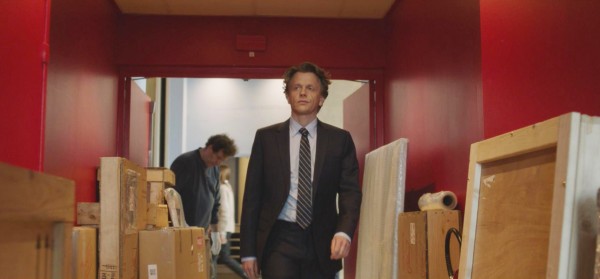
ALEX LUTZ IN PASCAL BONITZER'SAUCTION
Discovery of a long lost Egon Schiele painting leads to excitement
In Auction/Le tableau volé,an appraiser of the French Hôtel Drouot auction house, André Masson (Alex Lutz), gets the information that a factory worker in Mullhouse who lives with his widowed mother has come across what he thinks is a lost painting by Egon Schiele last recorded in 1939, when it was seized from its Jewish collector by Nazi officials.
It's the sharp dialogue and the testy personal relations that keep us watching, though, and make this not only an art thriller but a study in human nature. Masson is at the center, and beside him his odd new assistant Aurore (Louise Chevillotte), who may not have Bruce Chatwin's famous "eye" but is devious, a liar, and has up her sleeve some very ingenious high level techniques of gaming the auction system. One of the concrete "actions" of the early scenes is her finding a handsome, stylish fur and leather short coat for herself for 150 euros on sale in the house. It would be worth more like 20 thousand, but fur is dead on the market, and the dealer who has a bid on it is cheap. Thus the skillful Bonitzer, who wrote for Jacques Rivette and for Cahiers du Cinéma, knows how to weave sophistication and status consciousness into writing about a world that can't be brought to life without them.
Masson reveals to the trainee that despite his glamorous car and box full of luxury watches, he, like her, like the new possessor of the Egon Schiele, comes from the sticks.
Masson has a cordial relationship with his ex-wife (Léa Drucker), who's been ex- for a decade. Something makes Masson and his ex-wife think this supposed Egon Schiele is worth a trip to Mulhouse, and since he still loves collectible cars, she suspects he'll enjoy the quite marvelous museum of those there, of which we get a tempting glimpse.
When they see the painting, they immediately know it's authentic. This moment vies with the moment of the auction sale for focusing the greatest excitement that the search for lost art treasures can bring.
A cornerstone of the tale is the boyish, sensitive young factory worker (Arcadi Radeff), who is thirty going on nineteen. The discovery of the painting brings about immediate trouble with his potes, his buddies, with one of whom he gets into an intense physical struggle after the other guy wants to turn over the painting and see the back. A charm of the latter part of the film is seeing the young man, who has refused to put on a tie for the auction house people's visit, go with his provincial lawyer representative (Nora Hamzawi), and be put up by Hôtel Drouot at a large, posh hotel with a view almost on top of the Eiffel Tower, to attend the auction dressed in a well cut suit. He disappears for a while thereafter, wandering off, and is found hunched on the paving, crying. Later, members of the Jewish family of the original owners gather and applaud the boy and shake his hand. Rich now, he buys his mother a new house but returns to his factory job and his potes.
But before this can happen there is an obstacle to the brisk 25 million euro auction sale: the wealthy representative of the now American Jewish family of the original collector is manipulated by his French lawyer into vastly underestimating the value of the painting and deciding on selling it for cheap. He has to be skillfully blocked from doing this. This is where Masson's dicey assistant Aurore comes in, with an ingenious ploy to save the painting for auction and bring it in closer to its real value.
It's all wonderfully tricky and fascinating, and a Variety preview explains Bonitzer had originally envisioned this as a TV series: there's so much material one can see why. On the other hand, this makes an unusually layered feature, and I'm looking forward to seeing it again. The relationship between Masson and Aurore prickles and sparkles throughout the film. Before she comes to a drunk and hopeless Masson, five "single malts" to the wind, gives him a script to address the American Jewish collector representative and change his mind about a cheap sale, she has already become so angry and insulted by Masson she has quit and walked out. But a lost Egon Schiele is the kind of thing that makes personal issues dwindle.
A bit of conventionality in the writing comes with the usual overhead plotting. Right after the auction conducted by Masson in which the painting has sold for 25 million euros (possibly too little, given that Klimt's The Kiss went for 135 mil) Masson's boss (Francis Vierville) has edged out the company's chairman and now puts him in his place, thus shuffling Masson to a desk job away from the excitement and suggesting he too may be soon offed, so he decides to go out on his own.
I'm not sure all the details make sense, or that I understand fully how profits of the auction are divided up. I've mentioned the likelihood that the auction sale price is too low. It also seems, though it's not clear perhaps, that the sale has been scheduled too soon. Masson has mentioned the need to prime the market early on.
In the end none of these questions detract from what a very sharp, exciting, and entertaining film this is.
Auction/Le tableau volé, ]91 mins., has its French release May 1, 2024. No other information. Screened for this review as part of the Rendez-Vous with French Cinema at Lincoln Center, New York (Feb. 29-Mar. 10, 2024. Showtimes:
Friday, March 1 at 9:00pm (Q&A with Pascal Bonitzer)
Sunday, March 10 at 6:30p
Last edited by Chris Knipp; 02-23-2024 at 11:58 AM.
-
THE BOOK OF SOLUTIONS/LE LIBRE DE SOLUTIONS (Michel Gondry 2023)
MICHEL GONDRY; THE BOOK OF SOLUTIONS/LE LIVRE DE SOLUTIONS (2023)
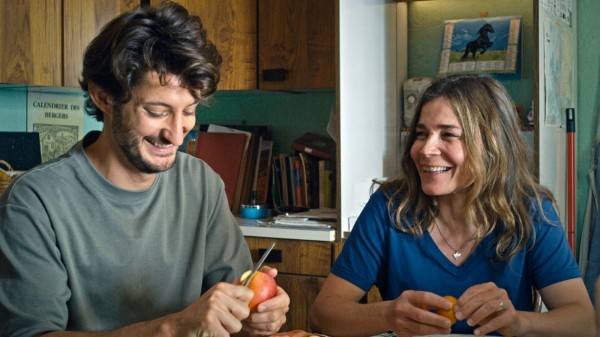
PIERRE NINEY, BLANCHE GARDIN IN LE LIBRE DE COLUTIONS
A talented young French filmmakers goes off his meds
Michel Gondry is a talented and original French filmmaker who has seemed to wander off the rails more than once. Many think his sophomore effort, the collaboration with Charlie Kaufmann Eternal Sunshine of the Spotless Mind was his high point as a director, not equalled despite seven films since. This new work, an examination of a young filmmaker, played by PIerre Niney, going off the rails, chronicles an emergency reedit done at the director's aunt's house in the country. The production company meeting in Paris has decided the movie is taking too long and going badly and takes it away from Gondry - er, Marc Becker (Niney). Becker calls his faithful staff and activates "Plan B." They seize the film and cart it to the aunt's house. The film is shot from here in a house belonging to Gondry's own late aunt Suzanne (profiled in his 2009 documentary The Thorn in the Heart, R-V 2010).
This revolt inspires Marc to throw away his daily meds. He essentially goes manic, entering into one wild scheme after another, forgetting ever to look at the actual film he's working on. He shows it, what there is of it, to the assembled town, but during this event he photographs the villagers - mostly sleeping - and forgets to review the film.
We must remember that this is a comedy, and some do find it funny, though neither the French press ratings nor the spectators' reflects wild enthusiasm (see below).
We might as well also note that when Owen Gleiberman reviewed the film for Variety at Venice where it debuted, the headline was "'The Book of Solutions' Review: When Did the Talented Michel Gondry Become the World’s Most Annoying Filmmaker?" This is unusually negative for a Variety review, and not typical of the general French response reflected on the website AlloCiné. On the contrary, they generally saw The Book of Solutions as a success.
What Gondry is doing here, apparently referring somewhat to what happened with him during the making of his Boris Vian adaptation Mood Indigo (Rendez-Vous 2014) - which might help explain its impenetrable denseness of invention - is letting his fondness for artisanal, unconventional, off-the-grid filmmaking show to the max. Some of that came out more sweetly and playfully in his last film (2015), the boyhood adventure tale Microbe & Gasoline, where two kids build an improvised "car" to travel across the country during their summer holidays. But in The Book of Solutions Gondry doesn't quite come to terms with the mental derangement aspect - or that the repetitive whimsy of Becker's often nutty inventions may pall after a while.
A colleague expert in the history of advertising tells me about the pioneering role Gondry played in the use of CGI in film adverts and music videos. (Others have made this leap, including Spike Jonze and David Fincher.) Sometimes artists have trouble making transitions from short to longer forms. But The Book of Solutions may rather stand as some kind of ultimate statement about a filmmaker off the rails and off his meds going wild with bricolage in the provinces.
Here one can appreciate the unique Françoise Lebrun as aunt Denise, as well as Blanche Gardin as a loyal editor.
See Filmleaf September 2023 Venice note.
Also released at Venice Sept. 4 was François Nemeta's 80-min. documentary about the filmmaker, Michel Gondry, Do It Yourself! (IMDb).
The Book of Solutions/Le Livre de solutions, 103 mins., debuted at Camnes Directors Fortnight May 23, 2023. Limited French release Jun. 7. AlloCiné Press rating: 3.8 (76%) spectators 3.0 (60%).
Screened for this review as part of the Rendez-Vous with French Cinema at Lincoln Center, New York (Feb. 29-Mar. 10, 2024. Showtimes:
Thursday, March 7 at 6:00pm
Sunday, March 10 at 4:00pmr)
Sunday, March 10 at 6:30pm
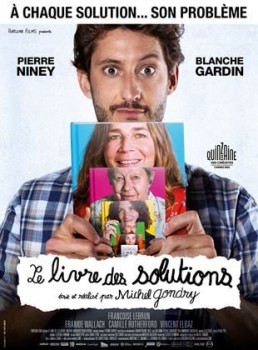
Last edited by Chris Knipp; 02-23-2024 at 10:42 AM.
-
LITTLE GIRL BLUE (Mona Achache 2023)
MONA ACHACHE: LITTLE GIRL BLUE (2013)
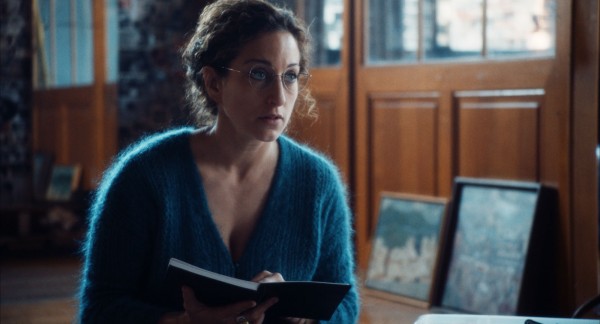
Marion Cotillard in a hybrid doc about the filmmaker's gifted mother
This intense relived portrait of the filmmaker's artistic mother tells of a Fifites and Sixties generation that was inventive and avantgardist more than normal, and also delved into drugs and experienced exceptional disfunction and abuse. A very mixed bag, then, and I confess that the 99 minutes seemed unusually long. This despite remarkable details fully justifying such hybrid documentary portraiture.
And the heart of the latter is the dramatized portrait of Carole, the director's mother and the subject of the film, as a slim woman, embodied by the great Marion Cotillard. The most memorable sequence is the opening one in which Cotillard sits at a desk with the filmmaker, who gives her slacks, blouse, wig, necklace, rings, glasses, even brown contact lenses to alter her eye color from blue to Carole's, and she slowly dons these and ritually, magically, becomes her subject.
It is unsurprising that this film was César-nominated.
It is, however, depressing to learn in detail of the mother's abuse by her father and by the writer Jean Genet, a family friend who was close to her when she was quite young. Further depressing to learn of her drug-addled move with her father, or one of the abusive "Jeans" in her life, and turning to prostitution because they had arrived in New York penniless. In the creativity it is hard sometimes to find positive values.
Little Girl Blue 99 mins., debuted at Cannes May 31, 2023, Paris premiere Jun. 20, 2023. Many other international festivals including Telluride. AlloCiné press 4.0 (80%), spectators 3.4 (68%). Screened for this review as part of the Rendez-Vous with French Cinema at Lincoln Center, New York (Feb. 29-Mar. 10, 2024. Showtimes:
Friday, March 1 at 6:15pm (Q&A with Mona Achache and Marion Cotillard)
Wednesday, March 6 at 8:30pm
Last edited by Chris Knipp; 02-23-2024 at 10:40 AM.
-
SPIRIT OF ECSTASY/LA VÉNUS D'ARGENT (Héléna Klotz 2023)
HÉLÉNA KLOTZ: SPIRIT OF ECSTASY/LA VÉNUS D'ARGENT (2023)
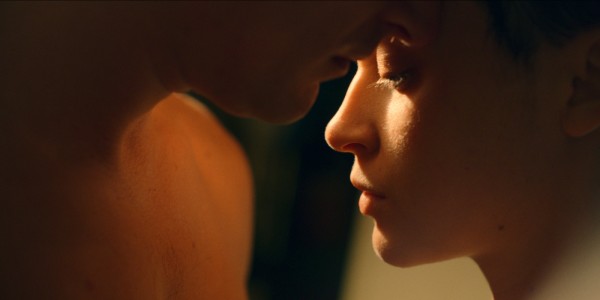
NEILS SCHNEIDER, "POMME" (CLAIRE POMMET) IN VÉNUS D'ARGENT
A non-binary look at high finance
This is a leap forward for Héléna Klotz from her debut The Atomic Age/L'âge atomique. Much of the success and mesmerizing originality of the film, which Vogue France calls "le choc féministe et esthétique de 2023," can be attributed to the use of the pop musician Pomme, Claire Pommet. Her character is called Jeanne Francoeur, and she is the support of a motherless family with two small kids, where the dad, Adrien (Grégoire Colin) is a member of the gendarmerie who can't quite make ends meet. They live on a military base that seems like a high class white cité. It's safe, but you can see why she'd want to get away from it, though she doesn't want to abandon those who depend on her. On the other hand she is wildly ambitious. Or does she just do a great job of pretending to be? Everything about Jeanne is both tentative and bold, evident and mysterious. The whole film has an excitement and a glow.
Jeanne is often passive or unresponsive, but that is the way this 23-year old intern at an investment firm is being now. She's in blurbs called "non-binary" but I'd rather call her "gender-questioning," and the arc of the action reflects that. I was reminded strongly of one of my inspirations of recent years, the short-lived HBO series "We Are Who We Are" directed by Luca Guadagnino (which I've referred to also in connection with the R-V film Red Island). It focuses on a 14-year-old gender-questioning boy and girl. He is Fraser Wilson (Jack Dylan Grazer), son of the new lesbian commander of a US military base in Chioggia, Italy (played by Chloë Sevigny), who has come with her wife. She is Caitlin Poythress, (Jordan Kristine Seamón ), daughter of one of the African American NCO's, who doesn't like the new commander.
These dependents of Jeanne suddenly turn out, strangely, to include Augustin (Niels Schneider), her handsome and sweet former beau, a Dragon (member of the French Dragoon Regiment) who has been on maneuvers in Africa for four years. We hear him give inquiring locals a candid description of the experience. Augustin now returns expecting to resume the relationship with Jeanne he has naively treasured while she has been trashing it in her mind, seeing their coming together as non-consensual because the male took the lead.
The action almost reverses itself, following a shocking disappointment. Professionally, Jeanne dreams of being high up in the world of high finance - investment banking or hedge funds - despite the fact that she is rather new to the practice of the game, following two years at Saint-Cyr military academy and several years in a state school of finance. Trying to become a quantitative analyst (or "quant"), Jeanne binds her breasts and wears a mannish suit, while still using her female name. By spotting an error in computer code, she instantly parlays her role as an intern into a desirable job offer from her boss, Farès (Sofiane Zermani, the Algerian-descent French rapper). Farès next impulsively offers Jeanne a high paying quant position in Singapore, where he is about to go. "I need brilliant people around me and I thought of you." He will take her with him. Or will he?
Don't read what follows if you don't want to know.
In the event, Farès screws her over, we don't know what for. Then she returns with nothing, as fast and light as she had gone out, and rejoins her father and siblings. She also rejoins Augustin, whom she has left without any promises. He helps her shave her head (recalling a key sequence in "We Are Who We Are"), but, that gender-misdirection notwithstanding, they seem to be in each other's arms.
She didn't tell Farès she was trans. When he asks, "You're lesbian, right?" she told him she was non-sexual, "neutral, like numbers." Was her sexuality on hold? Did the rebuff of her kiss by the baritone-voiced woman head of the World Aid ecology fundraising firm Elia Müller (Anna Mouglalis) of which Mathieu Amalric is a patron, turn her off to lesbianism? All we know is that after a period of selling expensive watches, she is applying for a high finance quant job again.
Along the way, she has taken as her symbol the "Venus of Money/Vénus d'argent," the hood ornament of the Rolls Royce.
This film seems wildly experimental in retrospect and even while watching it seems fantastical many steps of the way, but this is what makes this fast-moving tale so interesting and fun. We are swept into Jeanne's exciting world. Or I was - the French critics and spectators weren't universally sold on it. French Vogue notes the alternating yellow and blue color scheme of the cinematographer, Victor Seguin, and the "enveloping" score by the director's younger brother, Ulysse. Certainly an attractive package, irresistibly anchored by the riveting presence of Pomme.
Spirit of Ecstasy/Le Vénus d'argent, 95 mins. AlloCiné press and spectators ratings both 3.0 (60%). Screened for this review as part of the Rendez-Vous with French Cinema at Lincoln Center, New York (Feb. 29-Mar. 10, 2024. Showtimes:
Monday, March 4 at 9:00pm
Friday, March 8 at 6:15pm (Q&A with Héléna Klotz)
Last edited by Chris Knipp; 02-23-2024 at 10:39 AM.
-
BANEL & ADAMA/BANEL E ADAMA (Ranata-Toulaye Sy 2023)
RANATA-TOULAYE SY: BANEL & ADAMA/BANEL E ADAMA (2023)
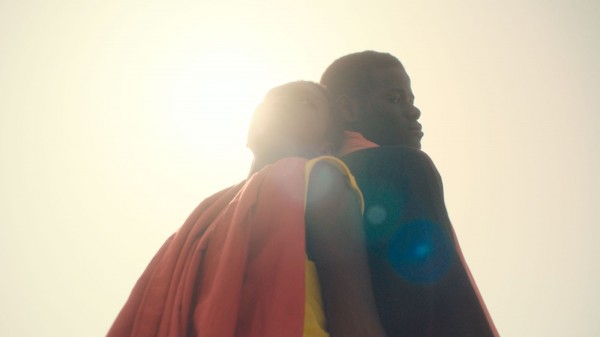
KHADY MANE AND MAMADOU DIALLO IN BANEL & ADAMS
Love in a dry climate
Though consciously artificial, this Senegalese tale about a remote, sandy village plagued by drought and wind and a young loving but troubled couple - Banel (Khady Mane), the wife, with cropped hair and a determined air; Adama (Mamadou Diallo), tall, handsome, beautifully dressed even just for minding cattle - makes for a striking, beautiful film, in the tradition yet elegantly original, that whirls us away in a great sand storm as if it was all a dream. Comparisons have been made with Terrence Malick’s Days of Heaven, and indeed this is the most stylized, poetic filmmaking. It's also Africa, distilled into freely flowing outdoor theater of a striking purity. There are no visions or flashbacks, by the way. Every meeting hovers between symbol and direct token.
As usual in movies about traditional African villages, individuals are part of a tight network of religion, laws, tradition, and inheritance. Adama and Banel have always loved each other, but Banel had to marry someone else, who died. Then they could marry. But a chieftain has perished and by inheritance, Adama must become chief, though he is only nineteen. (When we hear that, and then look into his face, we realize he is, despite his statuesque beauty, very young - and without much experience.). He nonetheless stoutly refuses to become chieftain. He does not want to do it. And he does not do it.
Banel is in revolt too. she says that she works from dawn to dusk every day, but she balks at her formidable mother (Binta Racine Sy) in her urgings that she do laundry, or other household tasks. Later she even declares that she does not want to have children. Though there is nothing modern here, she is non-traditional. And a prologue scene as well as her cropped hair suggest she likes women as well as Adama. She likes to kill birds with a slingshot Who is this woman? That is the beauty of it: we don't know.
Banel and Adama have made a plan to dig out the houses on the edge of the village that are buried in sand and live in one, to be by themselves. Adama goes there sometimes by himself and one day returns to tell Banel as if he has seen a vision that he has found what will be their bedroom, a vast room that gives a great sense of freedom. It's like a dream, a new ideal life in sight.
But it will remain only a dream because a gradual slow plague of heat comes upon them. Adama goes out every day to tend the cattle herd because it is in danger. Some of the cattle have died from the heat. Banel protests that he is never there and she never sees him. To a young woman she cynically describes a woman's life as one long round of duties and all the men as interchangeable. Where is the love gone? Onto the sheets of paper, where she writes "Banel & Adama" over and over like a schoolgirl learning cursive, and she says the words too over and over, like an incantation.
More cattle die. Then all the cattle die. And then men leave because there is no life for them here. Some reviews have felt that Sy fumbles the ending, and indeed it is the buildup that is best. Jessica Kiang wrote sympathetically of Banel & Adama in her Cannes Variety review. "Sy’s film," she says, "is a curious little fable, not quite fully formed in its final stages, and occasionally so sedate and opaque, under Bachar Mar-Khalifé’s melodic, piano-forward score, that it feels like it is drowsing." She also spoke of the images, "Glorying in the impressionistic prettiness of DP Amine Berrada’s camerawork, with its signature images of sun flares and sand dunes." She concludes that desite limitations "it’s a striking debut nonetheless, especially as it revolves, with graceful poetry around the inner experiences of such a curious, unknowable woman." Yes. This is a fresh, fable-like entry in the African cinema of village life. The young, beautiful dirctor (see her shine at the Cannes Q&A) was born in France of Senegalese parents. Northern Senegal, familiar from regular holiday visits, was a palate for her to paint with. She has drawn, among other things, a tale of global warming.
Banel & Adama/Banel e Adama,, 87 mins., Pulaar with English subtitles, debuted in competition at Cannes May 20, 2023, showing also at Munich, Melbourne, London and other international festivals. Rleased in France Aug. 30, 2023, it received an AlloCiné press rating of 3.0 (60%) and spectators' rating of 3.2 (64%). A Kino Lorber release. Screened for this review as part of the Rendez-Vous with French Cinema at Lincoln Center, New York (Feb. 29-Mar. 10, 2024. Showtimes:
Sunday, March 3 at 1:00pm (Q&A with Ramata-Toulaye Sy)
Wednesday, March 6 at 3:45pm
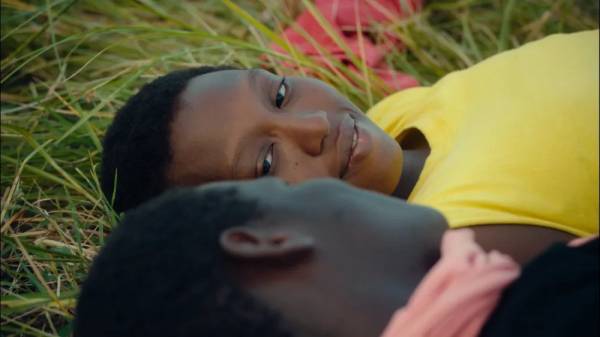
Last edited by Chris Knipp; 02-23-2024 at 10:39 AM.
-
BÂTIMENT 5/LES INDÉSIRABLES (Ladj Ly 2023)
LADJ LY: LES INDÉSIRABLES/BÂTIMENT 5 (2023)
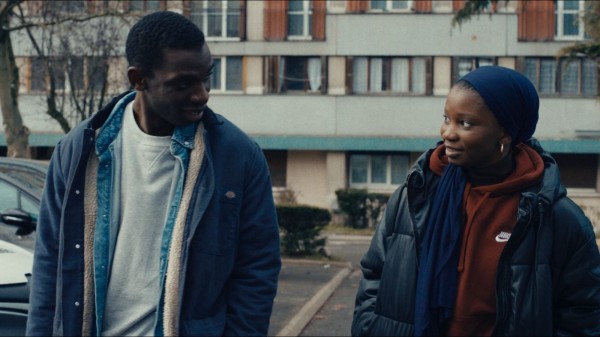
ARISTOTLE LUYINDULA, ANTA DLAW IN BÂTIMENT 5
Ladj Ly issues another powerful cinematic blast against political inequality in France
In his sophomore feature, Les Indésirables/Bâtiment 5, Malian-born filmmaker Ladj Ly follows up on his 2019 Cannes Jury Prize-winning Les Misérables with another turbulent depiction of Parisian social inequality. The new film surges powerfully and excels technically, with its fires, explosions and movements of masses of people. This is the work of an angry man (and in fact actual convictions show Ly is that). It draws its political and moral lines and acts out its Manichean oppositions with brute force.
But the new film rushes to its bad results so fast Ly's message loses the subtlety he had in the first film. Viewers certainly may end impressed or moved. The incessant action sweeps you along. But you may wind up feeling manipulated. Sadly, since in its way this is a powerful and well-made, and certainly a deeply felt film, in the end not much has been added to the French cinematic literature about the joys and woes of the banlieue. If we look back at Les Misérables, despite the anger, there was more complexity - more characters, more incidents, a slower accumulation of meaning. Though the cops were hated, interestingly Les Misérables' story was told from their point of view.
The opening scene of the new film is a blast, literally. City officials stand on a podium waiting for old public housing towers to be demolished by an explosion and cut the ribbons on new construction. But the explosions were badly placed or excessive and as the building goes down the clouds and reactions endanger the gathered officials. In the shock, the mayor collapses and can't be revived.
Pediatrician Pierre Forges (Alexis Manenti), who continues his practice, gets quickly appointed as interim mayor to replace the fallen one. His wife Nathalie (Aurélia Petit) warns him he'll be in trouble; that he'll be dealing with areas and their inhabitants strange to him. He insists politics is his thing. He immediately turns into an avenger for the right with no sympathy for the downtrodden, coldly rebuffing anyone who approaches him with a personal appeal, and he carries out a series of cruel actions, first having unlicensed mechanics forcibly removed from the open space they've occupied for years. The inhabitants of the cité are scheduled to be relocated, but it turns out the plans for new locations provide no accommodations for big families. This is where the black sub-mayor in unsympathetic.
But it gets much wosrse than that. Ultimately when there's a fire in an unlicensed restaurant in the titular housing estate, he has its entire population suddenly evicted on the grounds that it is now structurally unsound, so they're unsafe. Making hundreds of people homeless to "protect them" is a spectacular outrage, and of course completely illegal and against procedures, as the black assistant mayor points out, to no avail. This really happened to the housing block Ladj Ly grew up in, and it was called "Bâtiment 5," the original film title; Ly collaborated with artist and photographer JR’s Chronicles Of Clichy Montfermeil project depicting the actual event (see the Deadline article and interview on this).
For a while it looks like the film will focus more on multiple viewpoints, certainly including the assimilated black assistant in the mayor's office and a Syrian immigrant family recently arrived. Ultimately besides the heartless interim mayor, though, there is just Haby Keita (Anta Diaw) and Blaz (Aristote Luyindula). She has decided to run for mayor against the unelected Forges, and starts a campaign with lots of signs, murals, and posters to publicize herself, but not many political speeches. She and Blaz are close. But while she is working slowly to enter politics, he impulsively resorts to violent action, and gives the movie its crudely satisfying revenge. Nothing is going to restore the evicted residents whose lives have been trashed.
The film, though largely true, reads as bold agitprop that may make you angry, but one may ask if artistry is not discarded in the interest of shaking up the viewer. A great deal of time is spent on the eviction, on the turbulent crowd and the visual enactment of beds and furniture `and possessions lowered or tossed out of windows in a tragic effort to save them, of kids searching for their plushies, of a few struggling to go back in for lost items, and the cops, a hostile force full of the adrenalin of an avenging army, brutally moving them out. Ly achieves impressive ensemble acton here. And this is of course his main subject: to recreate a personal trauma: this recreation is something he had to do. It may seem excessive; but Carlos Aguilar suggests in his Toronto Variety review that this is "the rare instance" when Ly "allows the images to speak for themselves" rather than have a character "instructively claim why we must care."
The climax is a sudden, shocking solitary action of revenge against the mayor by the desperate Blaz, who terrorizes his family and destroys his Christmas decorations, in the process terrorizing the Syrian family the mayor has invited in for the celebration, as if vicariously to "convert" them. (Someone earlier has mentioned a rumor that for Muslims, celebrating Christmas may be haram or unlawful. But the Syrians have gotten short shrift here.)
Haby's warmth and simple charisma provide some hope of a voice for the voiceless. But the violence leaves you shattered: the abrupt revenge finale highlights that this, a much shorter film than Les Misérables, cuts corners to be that way. It's telling that Ly, the Cannes darling of four years ago, this time debuted at Toronto. Gael Golhen, reviewing for French Première, expressed some of the French criticisms in this quote: "Didactic (Haby's role), artificial in the sequence of situations and caricatural in the writing of characters and the performances (particularly that of Manenti), Bâtiment 5 is driven by good feelings, agitprop and the desire to settle scores. This is legitimate, but it renders the drama Manichean and ineffective."
Ly is a passionate director and an ambitious and driven one, and he surely will continue to draw attention. Hopefully he will work out a subtler balance between showing and telling, message and artistry, passion and analysis in future work.
Les Indésirables/Bâtiment 5, 105 mins., debuted Sept. 6, 2023 at Toronto, also showing at Zurich and London BFI. It opened theatrically in France Dec. 6, 2023. AlloCiné press rating 3.0 (60%) , spectators 2.7 (54%).
Screened for this review as part of the Rendez-Vous with French Cinema at Lincoln Center, New York (Feb. 29-Mar. 10, 2024. Showtimes:
Saturday, March 2 at 9:15pm (Q&A with Ladj Ly)
Thursday, March 7 at 8:30pm
Last edited by Chris Knipp; 02-23-2024 at 10:39 AM.
-
RED ISLAND/L'ÎLE ROUGE (Robin Campillo 2023)
ROBIN CAMPILLO: RED ISLAND/L'ÎLE ROUGE (2023)
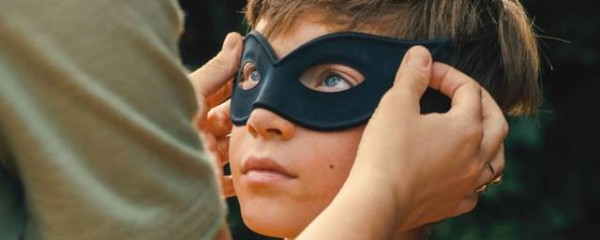
CHARLIE VARSELLE IN RED ISLAND
TRAILER
Welcome to Madagascar, 1972, "le lieu de tous les plaisirs" - and then farewell
These are embroidered and colorful autobiographical memories of a childhood period spent in a French colonial paradise. Though technically Madagascar became independent in 1960, twelve years later France is still being very paternalistic. The island has yet to liberate itself fully - as will be made evident by the revolt of the indigenous Malagsy people at the end. Sly eight-year-old Thomas Lopez (Charlie Vauselle) is the writer-director's alter ego, the hidden eye in many adult scenes he shouldn't be seeing and doesn't fully understand. His mother Colette is played by bee-sting-lipped Nadia Tereszkiewicz of Forever Young and Rosalie, his father Robert, alpha male of the group, by Spanish-born Quim Gutiérrez.
Peter Bradshaw was effusive about this movie, giving it a 5 our of 5 stars in the Guardian. (See his review for descriptions of many of the film's "glorious setpieces.") It is beautiful, but calmed and distanced by nostalgia - not as arresting and emotionally vivid as his gay-themed two previous films, Eastern Boys and 120 BPM.
Nor has it the psychological detail and realism of "We Are Who We Are," Luca Guadagnino's adventurous 8-hour HBO miniseries set on an American military base today near the Venetian suburb of Chioggia, where two gender-questioning fourteen-year-olds come of age. Campillo does however set his barely post-colonial world in sharp perspective, with fantasy interludes based on Thomas' comic book readings. There is a lot of good material, and images whose richly saturated color is a delight to the eye. The indirect way so much is represented puts us at one emotional remove, though, and the revolutionary finale is an odd new direction - though the filmmaker has shown a penchant for strong narrative shifts before, in the twists and surprises of Eastern Boys.
Thomas's school friend is a Vietnamese girl called Suzanne (Cathy Pham), who announces that to talking, she prefers "observing people." That's fine by him. They both adore the fictional girl Fantômette. Eventually Thomas takes to dressing up like her in tights, cape, and mask for his spying exploits. Suzanne thinks it would be fun to be an orphan like her "sometimes," to see what it's like. Some interludes end with Thomas being found hiding under the table or behind a wall. But others go into so much detail, the child-framing is lost. This is true both in the dramatic finale of the Malagsy demonstrators, and the marital breakdown of a new young couple on base, Bernard (Hugues Delamarlière) and Odile (Luna Carpiaux), and when Odile can't stand "abroad" and disappears and Bernard has an alcohol breakdown at a grand party given for the general, and a scandalous affair with a Miangaly brothal woman (Amely Rakotoarimalala). Thomas couldn't have seen all that. Still, the scenes between Suzanne and Thomas are wonderfully delicate, and their busy flights by small bicycle from place to place pull the film's episodes together.
Described in more conventional visual terms are events like macho dad Robert's rash gifting of three baby crocodiles to the three boys (Thomas' brothers aren't much identified, though the bigger, with his dramatic eyebrows, is vividly shown) - leaving to trouble and a reprimand from the commandeer when the older brother puts them in the public pool; of Thomas'' purchase of two gemstones from a traveling salesman that Robert - urning artistic - designs a striking ring for, to give to Colette.
The most memorable of the scenes are the parties and the air missions. Robert is involved in an airdrop of several dozen native parachutists to put down a revolt of agriculturalists. The French soldiers are here for this, but don't get directly involved. At parties a jovial and mustachioed fellow aviator declares what a "place of all pleasures" this island is, "le lieu de tous les plaisirs." It's evident the French have plenty of leisure to enjoy their status as colonial remnants in a lovely tropical place. But there are goings on fed by idleness, such as the wife-swapping or rivalries shown when one man dances flirtily with Colette, and Robert then dances flirtily with that man's wife. When someone comes with photos of sexual native statues, the blasé French parents don't mind Thomas glimpsing them. It's an indulgent and sophisticated world. But as Bradshaw says, Thomas is never used as a go-between, nor do we get direct images, till the end, of the "other" world of the local, indigenous, ostensibly now in charge people, or what they may think.
There is a farewell sequence, when all the French are preparing to leave this last base on the island. Suzanne tells Thomas she is not leaving, and says goodbye to him. He pouts for a long time, sitting on the ground, refusing to pose for a goodbye-to-all-that family photograph his father stages - though eventually he is coaxed into it and poses in front of the group, his father squatting and embracing him with both arms. But Thomas is bitter: he has said he wished he'd never come here, because he must leave.
There is nothing of the native point of view, that is, until Barnard's brothel girlfriend is with his restaurant coworker at the place they work, after hours, drinking good champagne. Thomas dozes off; and she says this is the time when you can relax with a white man, when he falls asleep - a memorable remark that suddenly puts everything in perspective.
In the final interlude - which we can't quite imagine Thomas as witnessing - local demonstrators who have been arrested and sent by he Malagasy governor to a penal colony, then in a surprise, and welcome, reversal brought back by plane and set free. Emerging one by one, three of the rebel political leaders stand outside the plane one by one, grasp a portable loudspeaker, and give an inspiring speech. It's a whole statement about how a young ex-colonial nation should find itself. An interesting, and highly relevant set of ideas. But however well-staged, this sequence can't help seeming tacked on. In its way Red Island is wonderful filmmaking and as personal as Campillo's previous two films Eastern Boys and BPM/120 battements par minute., but there is something relatively a little quaint and frozen in amber about it, but this is a beautiful, well-made film.
Red Island/L'Île rouge, 116 mins., released theatrically in France May 31, 2023, also showed at the Cannes/Le Chesnay, London, San Sebastián and Goteborg festivals. AlloCiné press rating 3.5=70%, spectators 2.7=54%. Screened for this review as part of the Rendez-Vous with French Cinema at Lincoln Center, New York (Feb. 29-Mar. 10, 2024. Showtimes:
Tuesday, March 5 at 3:45pm
Saturday, March 9 at 6:15pm (Q&A with Robin Campillo)

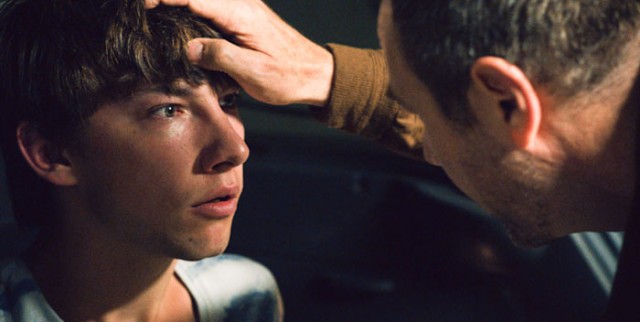
KIRIL EMELYANOV AND OLIVIER RABOURDIN IN EASTERN BOYS: SIMILAR FRAMING?
Last edited by Chris Knipp; 02-23-2024 at 10:38 AM.
 Posting Permissions
Posting Permissions
- You may not post new threads
- You may not post replies
- You may not post attachments
- You may not edit your posts
-
Forum Rules





 Reply With Quote
Reply With Quote










Bookmarks